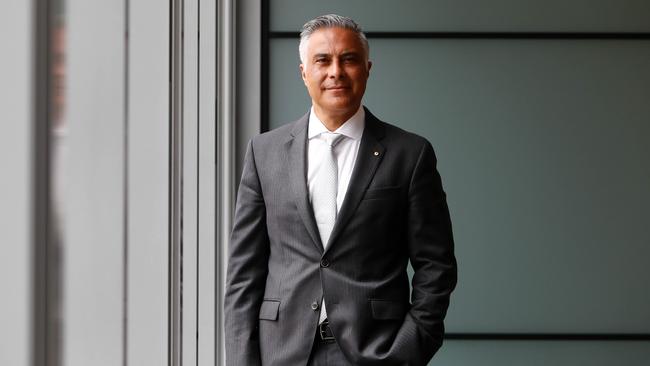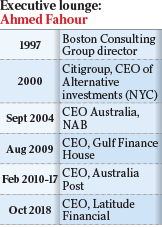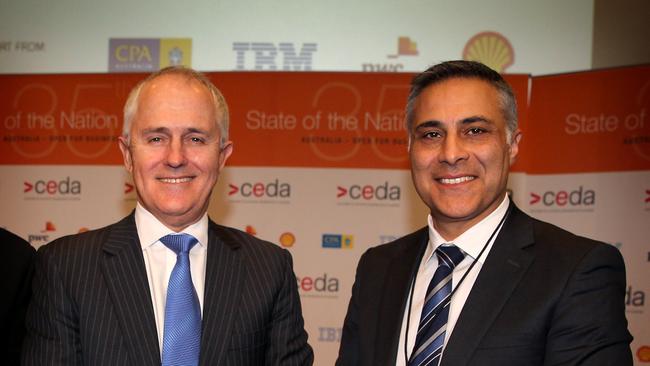‘Polarising’ Ahmed Fahour answers his critics
In his first interview since the failed Latitude listing, Ahmed Fahour admits he was bruised by the experience, but hits back at those that tagged him the ‘$51m man’.

The boardroom within the Melbourne headquarters of Latitude Financial Services on the western edge of the city boasts views over Docklands Park and the Harbour Esplanade, looking back towards the old glass towers of the CBD.
But today the blinds are half drawn and when the firm’s chief executive Ahmed Fahour enters the room 15 minutes late, he poses briefly for a photograph, absent his trademark cheesy smile.
He then purposefully takes his seat at one end of the long board table, his back to the view.
Among the towers behind him looms National Bank House at 500 Bourke Street, where Fahour spent four and a half years as CEO of the Australian operations of National Australia Bank.
In late 2008 he was passed over for the top job at the bank and the chance to run an Australian sharemarket-listed financial services company for the first time when then chairman Michael Chaney chose Cameron Clyne for the role.
More than a decade on, in October this year, Fahour missed out again on running a big listed group, but this time it was a lack of support from offshore institutional investors that condemned the $3.2bn float of Latitude, the consumer finance group previously known as GE Money.
It is now 60 days since Latitude’s owners, Deutsche Bank and private equity giants KKR and Varde Partners, abandoned the biggest IPO of the year.
Today Fahour, impeccably dressed in his trademark pinstripe suit furnished with his Order of Australia lapel pin, admits he was bruised by the experience.
“At the time, I was really disappointed. Disappointed that we set an objective and we didn’t make it, for the moment. But I am a pretty resilient person,’’ he tells The Weekend Australian in his first interview since the failed listing.
But he has needed to be. The collapse of the Latitude float gave his many long-time critics a fresh platform to cast stones. The headlines screamed “The $51m man” when his remuneration and shares package was revealed in the prospectus for the Latitude listing.
The drip-feed of media releases and stage-managed stunts — such as appearing at a Harvey Norman store alongside the chain’s founder to publicise a Latitude product — only perpetuated the feeling among some in the investment community that Fahour was trying to, in the words of one float critic, “put lipstick on a pig”.
Last week the 16-year-old fintech Tyro Payments successfully floated on the ASX, usurping Latitude as the largest float of the year — but raising four times less than what Fahour and his owners were seeking.

At worst the Latitude experience has again dramatised how much some love to hate the 53-year-old Lebanese Australian businessman.
“I genuinely don’t know,’’ Fahour muses softly when I ask why he so polarises public opinion.
“Maybe there is a little bit of ‘why does this guy do so well in life — why does he keep doing well financially’.”
Flashy and outspoken
Fahour has always been flashy and outspoken. Some call him an egomaniac. But perhaps, I suggest, the negative perceptions come down to two words: being greedy. Certainly Fahour has always been a master negotiator.
The salary headlines associated with the Latitude float were not the first.
At NAB Fahour secured a lucrative sign-on deal as part of a multi-million-dollar package. It prompted legendary former chief executive Neil “Nobby” Clark to muse that Fahour earned more in his first 28 days at the bank than Clark had in 45 years.
Fahour later became Australia’s highest-paid public servant, with a $5.6m pay packet, when recruited to head Australia Post.
The public outcry that followed the forced revelation of the salary was a factor in his departure from the postal giant in mid 2017.
That was despite him transforming its profitability by focusing on its high-margin parcels business, which has since underpinned its survival as letter volumes continue to plummet.
“I just think that is some people’s opinion,’’ Fahour says when presented with the provocative greed adjective.
“I don’t think that is the opinion of people I work with and it is not the general opinion of people who have seen what I can do and the value I have created. That word is a judgment by people who may not see the day-to-day of what is required to achieve results.”

On the issue of salaries, he says there is no question “that there will be some people who will have envy, people who don’t like it, but I consider myself to be somebody who is extremely fair, generous and hardworking … I have never, ever received something given to me for nothing.”
When Fahour left Australia Post he sensationally said it was “for others to judge” if he had faced greater public scrutiny because he was a Muslim.
He proffers no such assertion in relation to the Latitude critiques, but is quick to note: “I am not your typical white Anglo-Saxon male.”
“I don’t know if (religious faith) is a big component (of the criticism). I genuinely hope it is not. Then again when I worked in New York [he worked for four years at Citigroup in New York and in Australia before joining NAB in 2004] people really championed those who had nothing in their pocket other than a positive attitude and wanting to make something of their life and look after those people around them when they do well in their life,’’ he says.
“That is the kind of life I lead. I love giving a huge amount of what I make so I can help people in disadvantaged situations get a go as much as I got a go.”
Migrant story
Fahour came to Melbourne from Lebanon with his parents when he was three years old and after studying at two Catholic colleges and La Trobe University, he worked his way up in the corporate world.
He has backed a number of educational scholarship schemes to support diversity and multiculturalism and has been a substantial donor to the Islamic Museum of Australia.
To emphasise his point on success, he declares that Latitude — despite the distractions of the failed float — has continued to perform well operationally since he took the reins in October 2018, after former CEO Sean Morrissey returned to Britain for health and family reasons.
“I am pleased to say we are on track to meet or exceed our forecast of net profit after tax of $278m for the year (to December 31). That is up 12 per cent on last year. In my first year that is pretty pleasing,’’ he says.
In August Latitude became the third-biggest lender of new personal loans in the country, surpassing two of the four major banks.
In the float prospectus Latitude said it would make a $287.6m cash profit in the year to June 2020, which would be up 7.6 per cent on the June 30, 2019 number.
“I don’t see any reason why we won’t meet our June 30, 2020 forecasts,’’ Fahour declares.
He originally agreed to join Latitude as an investor and board member in 2018 but Sean Morrissey’s health issues led the company’s owners to ask him to step in to fill the breach.
Fahour says this explains why he stood to earn a discretionary equity grant worth as much as $22.5m — which was criticised by Financial Sector Union national assistant secretary Nathan Rees as “over the top” — if the Latitude float priced at the top of the value range.
“That was a deal we had struck as part of my deal to co-invest. It is quite normal for private owners and investors to do deals with each other,’’ he says, stressing the bonus was required to be paid from the pre-float shareholder’s equity, not out of the proceeds of the IPO. He stresses the only money he was guaranteed from Latitude’s would-be public shareholders was his base salary of $1.8m, calling the $51m headline number a result of “comparing apples, oranges and pears”.
“The rest of my salary (up to $4.8m, including $1.8m in short-term incentives and $1.24m in long-term incentives) was a function of performance,” he says.
Fahour also purchased 12.6 million Latitude shares using an interest-free, non-recourse loan of $17.5m and his own funds, which would have been worth $28m if the float priced at the top end of the range.
“That was my money that I put in because I believed in the future of this business. It was going to be locked up for two years,’’ he says.
“Most of the fund managers I met applauded the fact of the money I put in and that it was locked up for two years.”
‘Marketing spin’
Many in the investment community were also bemused about the pre-float marketing of Latitude as a fintech company, riding on the coat-tails of ASX technology stocks Afterpay, Wisetech and Appen. Some called it “marketing spin”.
But Fahour counters that Latitude was seeking a valuation multiple in line with what the ASX itself is trading at.
“If we were trying to get a fintech valuation, these fintechs are trading at 10 times revenue. So that means we should have asked for $10bn!’’ he quips.
“What a lot of these fintech make in revenue, we make in profit.
“What I think some commentators were saying was, ‘how dare you say you are a technology company when you have been around 30 years, before the internet was created’. Today the majority of our service with our customers does use technology and we will continue to innovate.”
One of those innovations was expanded this week in a deal with Mastercard that will allow its LatitudePay product customers to buy-now-pay-later, interest-free, anywhere Mastercard is accepted globally.
Fahour was criticised during the IPO process for talking up Latitude’s belated move into the high-growth BNPL sector behind the likes of Afterpay and Zip Money, which arguably distracted from the underlying profitability of its core operations.
Latitude makes about half its operating income from instalment loans, with most of the remainder coming from personal loans, car loans and credit cards.
Fahour counters that the growth of the LatitudePay product — it is now used by over 100,000 Australians and 550 local merchants have signed up to the service, above the IPO prospectus forecasts — was proof of its growth potential.
“I’ll let the numbers talk for themselves. The proof is in the pudding,’’ he says.
Fahour puts down the float experience to “unfortunate timing”, noting that “at that moment the markets’ appetite for price and quality didn’t meet what my shareholders were prepared to accept.”
One investment banker involved in the process says one of its biggest obstacles was the lack of international investor interest in Latitude, especially in the wake of fallout for the Australian financial services sector from the Hayne royal commission.
They say Fahour’s energy, enthusiasm and connections enabled the company to generate at least some offshore interest.
“He was a good hire and they would not have got close without him to be honest,’’ the banker says. But it wasn’t enough.
The float process itself was also challenged. Analysts were not given long to prepare research reports or market them and the roadshow and bookbuild were conducted in an extremely ambitious time frame.
Tight timeframe
Fahour acknowledges the time frame was “tight” but says Latitude’s owners didn’t want the float process to be a distraction. After discounting the company’s value twice but still failing to get the deal away, many are now wondering if a third run at the boards for Latitude is a realistic possibility.
Fahour acknowledges his owners will “have to try something”.
“At some stage in the future, they will have to look at an exit. Right now the instructions are, ‘We are happy to hold the business. Get on with the job’.”
Yet whatever explanations he provides for what went wrong, Fahour’s critics will not go away. He will always polarise opinion.
Asked if he believes the critics would be less vocal if he lived in Sydney instead of Melbourne, he proffers: “I don’t know the answer to that, but let me tell you the slight difference between Sydney and Melbourne — when I worked in America and New York versus when I work here, there is a difference in how people think about success,’’ he says.
“I think [Melbourne] is a little bit more conservative, a bit more understated. There are other markets which really celebrate people who have nothing and make something of their life, people who have a go, people who try.”
Fahour acknowledges that over 35 years in business, he has always driven at “a million miles per hour.” It has made him enemies.
Latitude was another speed hump in his life that he admits knocked him “off the path”.
“But I pick myself up, dust myself off, put the coat back on, get back in the car and go again,’’ he says, now with a wide smile. “And that is where I am right now. I am going again. And I think the best way to answer the questions is by delivering the outcomes for the business.”


To join the conversation, please log in. Don't have an account? Register
Join the conversation, you are commenting as Logout